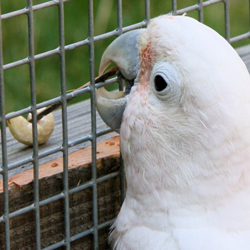Animal Cognition
Empirical work with dogs and parrots
Alongside colleagues at the University of Auckland, I have contributed to empirical research in comparative cognition, a field that studies the evolutionary origins of cognition across non-human animal species.
In one of our comparative cognition projects, we studied the ultimate function of contagious yawning in dogs (see paper here). Contagious yawning is an interesting behaviour to study because it has been used as an indicator of empathy in non-human animals. In our experiment and re-analysis of previous studies, we found that dogs do indeed yawn contagiously, but we did not find evidence for particular biases in yawning (e.g. familiarity bias) that would be expected if yawning were an indicator of empathy. Dogs might have evolved empathic cognitive mechanisms, but if they have, contagious yawning is likely not a good indicator for them.

In another project, we have been studying how widespread tool use is across parrot species (see paper here). Tool use is another interesting behaviour to study because it requires sophisticated cognitive abilities. In our study, we found that tool use was more common in parrots than previously thought. Using crowdsourcing methods, we observed novel instances of tool use in 17 parrot species, more than doubling the confirmed number of tool-using parrot species. We also conducted phylogenetic modelling to make predictions for which other parrot species are likely to use tools.

Further Reading
Bastos, A. P., Claessens, S., Nelson, X. J., Welch, D., Atkinson, Q. D., & Taylor, A. H. (pre-print). Crowdsourcing and phylogenetic modelling reveal parrot tool use is not rare.
Neilands, P., Claessens, S., Ren, I., Hassall, R., Bastos, A. P., & Taylor, A. H. (2020). Contagious yawning is not a signal of empathy: no evidence of familiarity, gender or prosociality biases in dogs. Proceedings of the Royal Society B, 287(1920), 20192236.